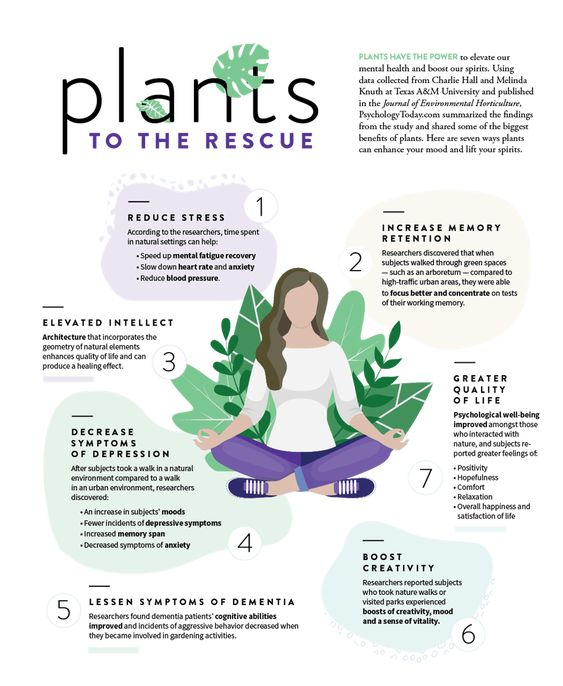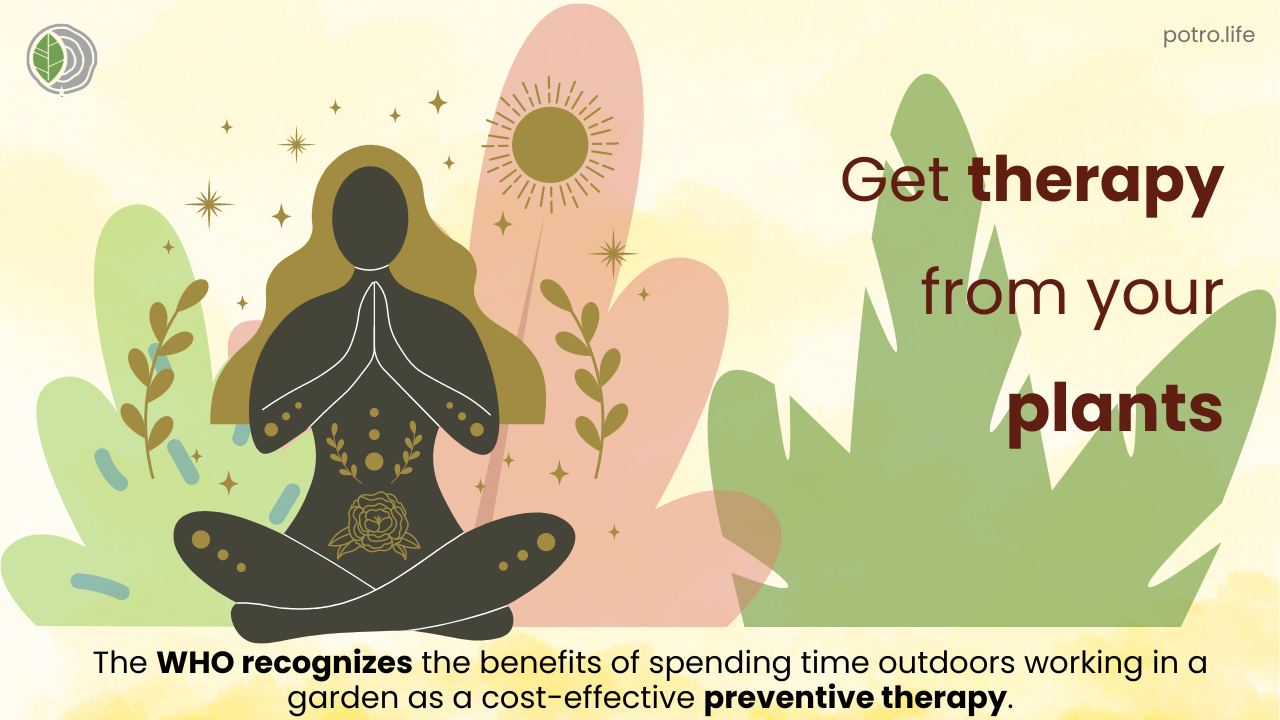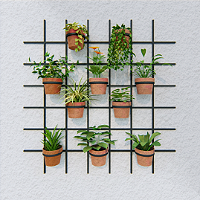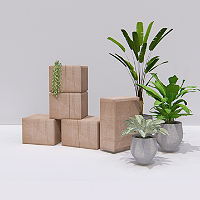Whenever we hear the word ‘healthy’ we get the mental image of a physically fit and sometimes even a muscular person. This image has been planted in our brains by different media. But a good health always includes a peaceful mind and a healed soul. Therefore, physical fitness is undoubtedly a major part of a good health along with mental health, which is just as much important.
When it comes to mental struggle, depression, anxiety disorder, stress disorder, feeling disconnected and social phobia are some of the most common symptoms of the adults of today’s society. Many people spend a lot of time and money on a professional therapist. Although seeking help from a therapist is always a good idea, most of us don’t recognise the awesome source of cost-effective preventative therapy option around us – nature!
The World Health Organization recognizes the benefits of contact with natural environments, including spending time outdoors working in a garden, as a cost-effective preventive therapy.
Gardening and mental health are closely intertwined, and engaging in gardening can have a positive impact on our well-being (Yang et al., 2022). Here are some ways in which gardening benefits mental health:
Keypoints
- Introduction
- Stress Reduction and Mood Improvement
- Mindful Presence and Stress Reduction
- Seniors (Elderly Adults)
- Social Connection
- Physical and Mental Health
- Positive Mood
- General Population
- Well-Being and Quality of Life
- Social Connection and Family Bonding
- Enhanced overall quality of life
- Horticultural Therapy
- Connection with Nature
- Physical Health Benefits
- Improved Diet
- Holistic Wellness
- Learning and Curiosity
- Creative Expression and Personalization
- Nurturing and Achievement
- References

Stress Reduction and Mood Improvement
Gardening provides an opportunity to connect with nature and take a break from daily stressors. Spending time tending to plants can reduce symptoms of depression and anxiety. It allows us to focus on nurturing living things and fosters a sense of accomplishment. Immediate effects include reductions in depression and anxiety symptoms, while regular gardening is associated with reduced stress and increased life satisfaction (Hawkins et al., 2011).
Mindful Presence and Stress Reduction
Being present in the garden allows you to escape from daily worries. Focus on the task at hand—whether it’s pruning, watering, or transplanting. Mindfulness while gardening reduces stress and promotes relaxation. Pay attention to the sensory details: the feel of soil (Bhatti et al., 2009), the scent of flowers (Jo et al., 2013), and the warmth of the sun (Tse, 2010)
Gardening has a positive impact on people of different age groups.
Seniors (Elderly Adults)
Social Connection: Gardening offers seniors an opportunity to connect with others, promoting socialization and a sense of belonging. As seniors tend to feel loneliness at higher rates than younger individuals, making gardening a social activity can help combat isolation.
Physical and Mental Health
Outdoor horticultural activities, which connect people with plant life, can promote physical and mental health. These activities improve happiness, and satisfaction, reduce loneliness, and relieve anxiety and stress among elderly adults (Shiue, 2016).
Positive Mood
Studies have shown that outdoor gardening activities positively influence mood in older adults. While there may not be significant changes in mood after engaging in outdoor gardening, the overall impact remains beneficial (Soga et al., 2017).
Well-Being and Quality of Life
Evidence from observational and interventional studies supports a positive role of gardening and horticultural therapy (HT) activities on well-being and general health. Interventions with horticultural-based therapies effectively improve well-being and quality of life both in the general population and vulnerable subgroups (An Exploration of the Meaning and Effects of Horticultural Therapy on Human Health and Well-Being – ProQuest, n.d.).
Social Connection and Family Bonding
Gardening with others fosters social relationships and family connections. Whether you’re planting seeds, weeding, or harvesting, involving loved ones creates shared experiences and strengthens emotional bonds (‘Yotti’ Kingsley & Townsend, 2006)
Enhanced overall quality of life
Regular gardening has been linked to improved overall life satisfaction and general well-being. It also positively impacts cognitive function and community engagement. The World Health Organization recognizes the benefits of contact with natural environments, including spending time outdoors working in a garden, as a cost-effective preventive therapy.
Horticultural Therapy
Horticultural therapy involves engaging individuals in gardening or other plant-based activities under the guidance of a trained therapist. Goals include reducing depressive mood, enhancing stress management skills, and improving overall quality of life. Gardening is now widely recommended for various medical and mental health conditions
Connection with Nature
Gardening fosters a connection with nature, which has numerous benefits. Interacting with green spaces, soil, and plants positively impacts mental well-being. Being surrounded by natural beauty and engaging in sensory experiences (such as touching leaves, smelling flowers, and hearing birds) contributes to a sense of belonging and connectedness.
Physical Health Benefits
Gardening involves physical activity, such as digging, planting, weeding, and watering. These activities contribute to overall fitness and well-being. Exposure to sunlight during gardening helps the body produce vitamin D, which is essential for bone health and immune function.
Improved Diet
Growing your own fruits and vegetables directly impacts your diet. Gardeners are more likely to include fresh produce in their meals. Different vegetables offer unique health benefits. For example: Peppers contain capsaicin, which has anti-inflammatory properties. Tomatoes are rich in vitamin C, potassium, and lycopene (an antioxidant). Sweet potatoes provide beta carotene, which supports overall health. Spinach boosts the immune system, and broccoli protects cells from damage (Davis et al., 2011).
Holistic Wellness
Gardening aligns with holistic wellness, which encompasses physical, mental, environmental, spiritual, and intellectual health. Whether you’re planting seeds, nurturing seedlings, or harvesting, gardening contributes to overall well-being (Bahamonde, 2019).
Learning and Curiosity
Explore new plants and learn about their care requirements. Gardening encourages curiosity and continuous learning. Discover the fascinating world of pollinators, soil microbes, and seasonal changes. Cultivate a sense of wonder in your garden (Green, 1994).
Creative Expression and Personalization
Design your garden according to your preferences. Choose colors, textures, and layouts that resonate with you. Gardening allows for creative expression. Whether you’re arranging flowers, creating a rock garden, or designing pathways, it’s an outlet for your imagination (Rahm, 2002).
Nurturing and Achievement
Caring for plants provides a sense of purpose and achievement. Watching seeds sprout, flowers bloom, or vegetables ripen gives a feeling of accomplishment. Nurturing living things—whether it’s a potted plant or a garden bed—boosts self-esteem and provides a quiet space for reflection. (Lekies & Sheavly, 2007).








